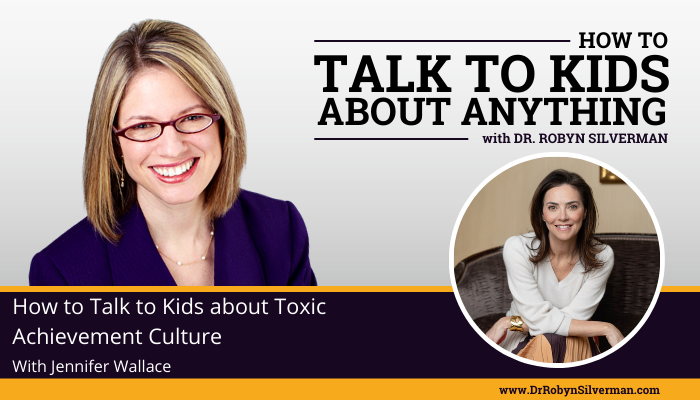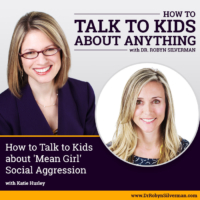Podcast: Play in new window | Download
Subscribe: Apple Podcasts | RSS | More
How to Talk to Kids about Toxic Achievement Culture

Together, let’s unravel the complexities of modern academia and discover how parental guidance can make a transformative difference in your child’s life. Join Dr. Robyn as she explores insightful strategies, heartfelt stories, and expert advice from award-winning journalist and author Jennifer Wallace.
Guest Expert: Jennifer Wallace
We’re probably all felt it—this ever-more competitive race that today’s students run each day towards the best possible future—feeling the crushing pressure to do more, more, more, jamming their schedules full of resume-padding activities, AP classes, tutoring and whatever else that can give them an edge over the rest so that they can get into the right colleges, that gets them on the right path towards the right future. At the same time, we have skyrocketing rates of anxiety, depression, self-harm and more—is it possible to help kids strive towards excellence without having the process crush them while on their way? For this, we are speaking with Jennifer Wallace.
Bio
Jennifer Wallace is an award-wining journalist and contributor to the Wall Street Journal and the Washington Post. She lives in NY with her husband and their teen teenagers—and she has a new book, out August 22, called “Never Enough: When Achievement Culture Becomes Toxic- And What We Can Do About It.”
Important Message:
- Who were the students who were thriving despite the pressure in their environment? What was their home life like? What did their parents focus on? What were their relationships like with their peers, with their teachers at school in the larger community? — I found about 14 or 15 common threads. The kids who were thriving had this high level of mattering.
- Mattering: Mattering was first conceptualized in the 1980s by Morris Rosenberg. He at the time in the eighties found that students who enjoyed a high level of a healthy level of self-esteem also felt like they mattered to their parents, that they were important and significant.
- Make them feel valued: The idea of feeling valued for who you are at your core, by your family, friends, community, and then being depended on add meaningful value back to your family, to your friends, to your communities.
- They still were anxious. They had setbacks, they would be down, but mattering acted like a buoy and lifted them up. They were able to bounce back faster.
- The kids who seemed struggle the most were kids who felt like their mattering was contingent on their performance. They absorbed the messages from their parents that they mattered, but they were never depended on or relied on to add value back to anyone other than themselves.
- The kids who lacked social proof that they mattered. They got the words, but they didn’t see an impact of how their life impacts others. It set them up to be so self-focused that their entire self-esteem and self-worth sort of rode on their ups and downs of their lives.
- Children need to know that they’re needed and that they make an impact on the family well-being.
- Involve them: “Can you guys help me solve this?” “What is it that we need?” “Why are the shoes not going in the closet?” It was a simple little thing, but it had an impact. They feel like they matter and then they get the proof that they matter, which then feeds their mattering.
- Make your home a Safe Haven: Our kids today are so bombarded with messages of achievement on social media in the classroom. They read it on the news, the emphasis of getting into certain colleges. There is such an emphasis day in and day out on achievement that home needs to be a place to recover.
- Home can’t be another place where kids are feeling like they’re being dragged to excellence. Minimize criticism, prioritize affection.
- What caused mental health struggles among these youth was perceived criticism from parents. It might not even be that we think were being outwardly scolding and criticizing, but even subtle things are taken as criticism.
- Our teenagers are wired as we all are with a negativity bias. So if we pick up those negative statements or eye rolls, they will stick with us more than positive things do.
- Know your kid’s strengths: We make rituals around noticing, really letting our kids feel seen for who they are. So for birthdays in our house, we go around the table and we say one thing we love about the birthday person, and it’s always something inherent to who they are, that they’re kind, my daughter might say to my son, you are so kind, even to strangers. It’s noticing and celebrating and recognizing what really matters about that child. And it is their core character strengths. It is not the grades on the report cards.
- Motivating your kids: How to use a kind of healthy fuel to motivate kids without pushing them too hard? By not focusing on shiny outcomes, but instead on how the work gets done. So, you know, as parents, we can set perimeters and it’s really our job to help with the scaffolding and we could talk about how work gets done.
- Balancing everyday activities: Giving children enough playtime, downtime and Family Time every day. You can help your look at their day and say, this is what a normal amount of work is. We also have to look at our own modeling. Are we taking time to play? Are we taking downtime? Are we sleeping? It requires modeling and then it requires the guardrails.
- Authentic Pride: Healthy pride and hubristic pride are the types of pride we take in our shiny outcomes and they’re very much dependent on other people’s feedback. But our authentic pride is knowing that if we put the work in, the result will be the result and we have done the work we have done the best we could possibly do.
- Our Ultimate Job: You know, as parents, we are told that our ultimate job is to raise independent children who will go out there one day and be self-sufficient and that are an important goal of parenting. But what I have found in my research among the healthy achievers is that there’s actually a more profound goal, and that is to give them a mindset and skillset of interdependence. That means being relied on and relying on other people in healthy ways. Because the, the kids who were able to bounce back the fastest from setbacks were children who had this deep sense of worth, that they were worthy of reaching out for help. They were worthy of being helped, and they were also worthy of being a sense of support for somebody else.
Notable Quotables:
- “Children need to know that they’re needed and that they make an impact on the family well-being.”
- “Your worth doesn’t change whether you are down on the ground, get cut from a team, or soggy and wet going through life. Your value is your value. It does not change.”
- “Home needs to be a place to recover. It can’t be just another place where kids are feeling like they’re being dragged to excellence.”
- “Minimize criticism, prioritize affection.”
- “It’s noticing, celebrating, and recognizing what really matters to your child. It is their core character strengths, not the grades on the report cards.”
- “Not focusing on shiny outcomes, but instead on how the work gets done. As parents, we can set perimeters and help with the scaffolding. We could talk about how work gets done, after school, after a short break, before you’re too tired, that’s when we get our work done.”
Resources:
Note: Dr. Robyn’s special Back-to-School event:
You are all invited! Grab your ticket here: BacktoSchool.HowtoTalktoKids.com
- Jennifer Wallace’s Book: Never Enough: When Achievement Culture Becomes Toxic https://www.amazon.com/Never-Enough-Achievement-Culture-Toxic-ebook/dp/B0BN5742KY
- Website: https://www.jenniferbwallace.com/
- Facebook: https://www.facebook.com/jennifer.b.wallace.94/
- IG: https://www.instagram.com/jenniferbrehenywallace/?hl=en
The post How to Talk to Kids about Toxic Achievement Culture with Jennifer Wallace appeared first on drrobynsilverman.com.








